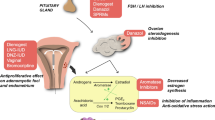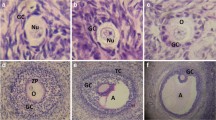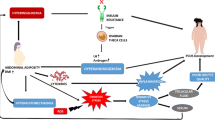Abstract
Purposes
Polycystic ovary syndrome (PCOS) is a major cause of female infertility, being present in up to 20% of women of childbearing age. Insulin resistance (IR) plays an important role in the pathophysiology of PCOS; therefore, its treatment may benefit women with the syndrome. The main drug used for IR management is metformin (MT). We aim to review the literature on the use of metformin in women with PCOS.
Methods
Using the terms “metformin” and “polycystic ovary syndrome,” we conducted a search the PubMed, EMBASE, and Google Scholar databases. The research was restricted to articles published in English. Initially, only published meta-analyses were included, in the absence of meta-analyzes, RCT and well-designed prospective studies were used.
Results
Metformin increases success rates and decreases complication rates when used as an adjunctive medication for ovulation induction during low complexity assisted reproduction treatments and during ovarian stimulation for in vitro fertilization in women with PCOS. Evidence about the effect of metformin on fetal and obstetric complication rates is conflicting. Metformin is associated with high incidence of gastrointestinal symptoms; however, serious adverse effects are rare and there is no evidence of teratogenicity.
Conclusion
For women with PCOS, metformin is a good adjunctive medication for ovulation induction/stimulation for high and low complexity assisted reproduction therapies. The adverse effects are mostly mild, and there is no risk of teratogenicity, but the risk of long-term complications for the offspring is not yet defined. High heterogeneity of the studies limits extrapolation of findings, and further research is needed to determine which women will benefit most from the medication.
Similar content being viewed by others
References
Bozdag G, et al. The prevalence and phenotypic features of polycystic ovary syndrome: a systematic review and meta-analysis. Hum Reprod. 2016;31(12):2841–55.
March WA, et al. The prevalence of polycystic ovary syndrome in a community sample assessed under contrasting diagnostic criteria. Hum Reprod. 2010;25(2):544–51.
Azziz R. Polycystic Ovary syndrome. Obstet Gynecol. 2018;132(2):321–36.
Yildiz BO, et al. Prevalence, phenotype and cardiometabolic risk of polycystic ovary syndrome under different diagnostic criteria. Hum Reprod. 2012;27(10):3067–73.
Goldzieher JW, Axelrod LR. Clinical and biochemical features of polycystic ovarian disease. Fertil Steril. 1963;14:631–53.
Lizneva D, et al. Criteria, prevalence, and phenotypes of polycystic ovary syndrome. Fertil Steril. 2016;106(1):6–15.
Magoffin DA. Ovarian enzyme activities in women with polycystic ovary syndrome. Fertil Steril. 2006;86(Suppl 1):S9-s11.
Toulis KA, et al. Adiponectin levels in women with polycystic ovary syndrome: a systematic review and a meta-analysis. Hum Reprod Update. 2009;15(3):297–307.
Foretz M, et al. Metformin: from mechanisms of action to therapies. Cell Metab. 2014;20(6):953–66.
Di Pietro M, et al. Metformin has a direct effect on ovarian cells that is dependent on organic cation transporters. Mol Cell Endocrinol. 2019;499:110591.
Sonntag B, et al. Metformin alters insulin signaling and viability of human granulosa cells. Fertil Steril. 2005;84(Suppl 2):1173–9.
Sharpe A et al. (2019) Metformin for ovulation induction (excluding gonadotrophins) in women with polycystic ovary syndrome. Cochrane Database of Systematic Reviews, (12).
Wang R, et al. First-line ovulation induction for polycystic ovary syndrome: an individual participant data meta-analysis. Hum Reprod Update. 2019;25(6):717–32.
Misso ML, et al. Metformin versus clomiphene citrate for infertility in non-obese women with polycystic ovary syndrome: a systematic review and meta-analysis. Hum Reprod Update. 2013;19(1):2–11.
Abu Hashim H, Foda O, Ghayaty E, Combined metformin-clomiphene in clomiphene-resistant polycystic ovary syndrome: a systematic review and meta-analysis of randomized controlled trials. Acta Obstet Gynecol Scand, 2015. 94(9): p. 921–30.
Palomba S, Falbo A, La Sala GB. Metformin and gonadotropins for ovulation induction in patients with polycystic ovary syndrome: a systematic review with meta-analysis of randomized controlled trials. Reprod Biol Endocrinol. 2014;12:3.
Kim CH, Chon SJ, Lee SH. Effects of lifestyle modification in polycystic ovary syndrome compared to metformin only or metformin addition: a systematic review and meta-analysis. Sci Rep. 2020;10(1):7802.
Naderpoor N, et al. Metformin and lifestyle modification in polycystic ovary syndrome: systematic review and meta-analysis. Hum Reprod Update. 2015;21(5):560–74.
Tso LO et al. (2020) Metformin treatment before and during IVF or ICSI in women with polycystic ovary syndrome. Cochrane Database Syst Rev, 12: p. Cd006105.
Wu Y et al. (2020) Association of metformin with pregnancy outcomes in women with polycystic ovarian syndrome undergoing in vitro fertilization: a systematic review and meta-analysis. JAMA Netw Open, 3(8): p. e2011995.
Tan X, et al. Effect of metformin treatment during pregnancy on women with PCOS: a systematic review and meta-analysis. Clin Invest Med. 2016;39(4):E120–31.
Zeng XL et al. (2016) Effects of metformin on pregnancy outcomes in women with polycystic ovary syndrome: a meta-analysis. Medicine (Baltimore), 95(36): p. e4526.
Zhao J, Liu X, Zhang W. The Effect of metformin therapy for preventing gestational diabetes mellitus in women with polycystic ovary syndrome: a meta-analysis. Exp Clin Endocrinol Diabetes, 2018.
Zhuo Z, Wang A, Yu H. Effect of metformin intervention during pregnancy on the gestational diabetes mellitus in women with polycystic ovary syndrome: a systematic review and meta-analysis. J Diabetes Res, 2014. 2014: p. 381231.
Underdal MO, et al. Does metformin treatment during pregnancy modify the future metabolic profile in women with PCOS? J Clin Endocrinol Metab. 2018;103(6):2408–13.
Patel R, Shah G. Effect of metformin on clinical, metabolic and endocrine outcomes in women with polycystic ovary syndrome: a meta-analysis of randomized controlled trials. Curr Med Res Opin. 2017;33(9):1545–57.
Wang J et al. Effects of metformin treatment on serum levels of C-reactive protein and interleukin-6 in women with polycystic ovary syndrome: a meta-analysis: a PRISMA-compliant article. Medicine (Baltimore), 2017. 96(39): p. e8183.
Palomba S, et al. Clomiphene citrate, metformin or both as first-step approach in treating anovulatory infertility in patients with polycystic ovary syndrome (PCOS): a systematic review of head-to-head randomized controlled studies and meta-analysis. Clin Endocrinol (Oxf). 2009;70(2):311–21.
Palomba S, et al. Evidence-based and potential benefits of metformin in the polycystic ovary syndrome: a comprehensive review. Endocr Rev. 2009;30(1):1–50.
Cassina M, et al. First-trimester exposure to metformin and risk of birth defects: a systematic review and meta-analysis. Hum Reprod Update. 2014;20(5):656–69.
Diav-Citrin O, et al. In-utero exposure to metformin for type 2 diabetes or polycystic ovary syndrome: a prospective comparative observational study. Reprod Toxicol. 2018;80:85–91.
Scherneck S, et al. Pregnancy outcome after first-trimester exposure to metformin: a prospective cohort study. Reprod Toxicol. 2018;81:79–83.
Hjorth-Hansen A, et al. Fetal Growth and birth anthropometrics in metformin-exposed offspring born to mothers with PCOS. J Clin Endocrinol Metab. 2018;103(2):740–7.
Hanem LGE, et al. Intrauterine metformin exposure and offspring cardiometabolic risk factors (PedMet study): a 5–10 year follow-up of the PregMet randomised controlled trial. Lancet Child Adolesc Health. 2019;3(3):166–74.
Rowan JA et al. Metformin in gestational diabetes: the offspring follow-up (MiG TOFU): body composition and metabolic outcomes at 7–9 years of age. BMJ Open Diabetes Res Care, 2018. 6(1): p. e000456.
Teede HJ, et al. Recommendations from the international evidence-based guideline for the assessment and management of polycystic ovary syndrome. Hum Reprod. 2018;33(9):1602–18.
Pundir J, et al. Meta-analysis of GnRH antagonist protocols: do they reduce the risk of OHSS in PCOS? Reprod Biomed Online. 2012;24(1):6–22.
Al-Inany HG et al. Gonadotrophin-releasing hormone antagonists for assisted reproductive technology. Cochrane Database Syst Rev, 2016. 4: Cd001750.
Jakubowicz DJ, et al. Insulin reduction with metformin increases luteal phase serum glycodelin and insulin-like growth factor-binding protein 1 concentrations and enhances uterine vascularity and blood flow in the polycystic ovary syndrome. J Clin Endocrinol Metab. 2001;86(3):1126–33.
Xiong F, et al. Metformin inhibits estradiol and progesterone-induced decidualization of endometrial stromal cells by regulating expression of progesterone receptor, cytokines and matrix metalloproteinases. Biomed Pharmacother. 2019;109:1578–85.
Dragamestianos C, et al. The Effect of Metformin on the Endometrium of Women with Polycystic Ovary Syndrome. Gynecol Obstet Invest. 2019;84(1):35–44.
Mao W et al. Efficacy and safety of metformin in the treatment of gestational diabetes: a protocol for systematic review and meta-analysis. Medicine (Baltimore), 2021. 100(1): e23954.
Azziz R, et al. Polycystic ovary syndrome. Nat Rev Dis Primers. 2016;2:16057.
Moran LJ, et al. Impaired glucose tolerance, type 2 diabetes and metabolic syndrome in polycystic ovary syndrome: a systematic review and meta-analysis. Hum Reprod Update. 2010;16(4):347–63.
Author information
Authors and Affiliations
Contributions
AGLN and FTLN conceived and implemented the study. All authors read and approved the final manuscript.
Corresponding author
Ethics declarations
Ethics approval
This study was exempted from the institutional review board approval, as it was a review.
Conflict of interest
The authors declare no competing interests.
Additional information
Publisher’s note
Springer Nature remains neutral with regard to jurisdictional claims in published maps and institutional affiliations.
Rights and permissions
About this article
Cite this article
Notaro, A.L.G., Neto, F.T.L. The use of metformin in women with polycystic ovary syndrome: an updated review. J Assist Reprod Genet 39, 573–579 (2022). https://doi.org/10.1007/s10815-022-02429-9
Received:
Accepted:
Published:
Issue Date:
DOI: https://doi.org/10.1007/s10815-022-02429-9




